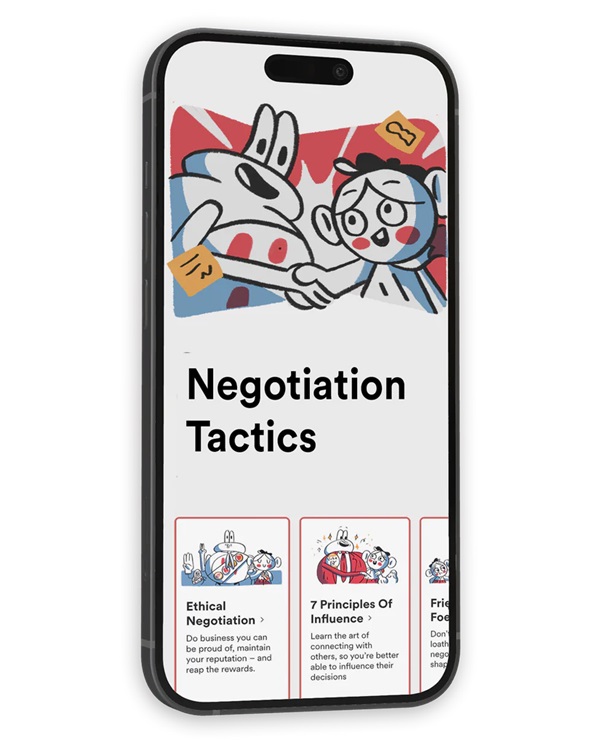[Group Buy] Pip Decks Negotiation Tactics
$95.00 Original price was: $95.00.$54.50Current price is: $54.50.
- Delivery: You Will Receive A Receipt With Download Link Through Email.
- If you need more proof ofcourse, feel free to chat with me!

Sales Page: https://pipdecks.com/products/negotiation-tactics
Delivery Time: 12 - 24hrs after paidDescription
Table of Contents
ToggleAce Every Deal – Mastering Negotiation Tactics for Win-Win Outcomes. Negotiation is an art, a science, and an essential skill in both professional and personal arenas. Understanding and implementing effective negotiation tactics can transform conflicts into collaborations and turn potential losses into mutual gains. Whether you’re hammering out a business deal, resolving a team dispute, or simply deciding where to eat dinner, mastering negotiation is a key to success.
Negotiation Tactics
Negotiation seeps into almost all aspects of our lives. It’s not just confined to the boardroom or the marketplace; it’s an integral element in our everyday interactions. From securing a job offer to resolving conflicts within a team, even deciding who makes the next pot of coffee involves a series of negotiations. Recognizing each of these moments and approaching them strategically forms the core of achieving successful outcomes.

The Ubiquity of Negotiation: Beyond the Boardroom
We often associate negotiation solely with formal settings like contract signings or salary discussions. However, the truth is far more encompassing. Negotiation, in its essence, is any conversation where there’s an opportunity to change what you gain, what you give up, or the direction you move forward. Think about asking for a raise – it’s a negotiation. Resolving a dispute between team members is another prime example. Even mundane decisions, such as where to go for lunch with friends or family, involve elements of negotiation as everyone subtly lobbies for their preference.
Recognizing this pervasiveness is the first step toward harnessing the power of negotiation tactics in your everyday life. Once you realize that every interaction holds the potential for negotiation, you become more mindful of your communication and more adept at spotting opportunities to influence outcomes. This shift in perspective empowers you to approach even trivial situations with a strategic mindset, ultimately leading to more favorable results.
Furthermore, understanding the ubiquity of negotiation allows you to hone your skills constantly. Every interaction becomes a practice ground, a chance to refine your approach and test new tactics in negotiation. You begin to observe how others negotiate, analyze their strategies, and adapt your own accordingly. The more you recognize and engage in these micro-negotiations, the more comfortable and confident you become in handling high-stakes situations. This continuous practice transforms negotiation from a daunting task into a natural and seamless part of your daily routine.
Ethical Foundations: Building Trust and Long-Term Relationships
The cornerstone of effective negotiation extends beyond mere compromise, it is also about building trust and cultivating relationships. Focusing solely on immediate gains often leads to short-sighted decisions that can damage future prospects. In contrast, ethical negotiation prioritizes creating mutual value, fostering long-term collaboration, and establishing a foundation of trust.
The core of tactics in negotiation should not be based on “sly tricks,” rather on honesty and integrity. Negotiation is about understanding the other party’s needs, finding common ground, and exploring mutually beneficial solutions. When you approach negotiations with empathy and a genuine interest in the other party’s well-being, you create an environment of trust. This trust, in turn, encourages open communication, facilitates creative problem-solving, and ultimately leads to more sustainable and rewarding outcomes for everyone involved.
Building trust requires transparency and consistency in your actions. Be upfront about your interests and limitations. Honor your commitments, and always be transparent about your intentions. When the other party knows they can rely on your word, they are more likely to reciprocate, creating a positive feedback loop of trust and collaboration. Instead of viewing negotiation as a zero-sum game where one party wins at the expense of the other, ethical negotiation tactics look to cultivate a spirit of partnership. This approach not only increases the likelihood of achieving a win-win outcome but also strengthens the relationship between the parties, paving the way for future collaborations and mutual success. In the long run, building trust and fostering lasting relationships is far more valuable than securing a temporary advantage through unethical or manipulative tactics.
Expert Insights: Learning From the Best
Drawing upon proven negotiation tactics, strategies, and frameworks from figures like Sue Williams is important. Sue Williams brings invaluable, real-world experience to the table, translating complex negotiation principles into actionable strategies, especially hostage negotiation tactics.
Learning from the best means understanding the core principles that drive successful negotiation, regardless of the context. These experts often emphasize careful preparation, active listening, and empathy as essential components of effective communication. They focus on understanding the other party’s perspective, identifying their needs and motivations, and finding common ground to build agreement.
Expert-driven tactics in negotiation provide a blueprint for navigating complex situations, mitigating risks, and maximizing opportunities. They also serve as a reminder that negotiation is a continuous learning process, that requires ongoing development and refinement of skills.
Moreover, studying the strategies employed by seasoned negotiators offers valuable insights into the psychological dynamics that underpin successful deals. Understanding how emotions, biases, and cognitive patterns influence decision-making can help you anticipate potential roadblocks, adapt your approach, and maintain control of the negotiation process. By incorporating these expert-backed principles into your own practice, you can elevate your negotiation skills to a new level and achieve greater success in all your endeavors.
Tactics in Negotiation
Negotiation tactics act as a compass, guiding you through the complex landscape of the negotiation process. Rather than approaching negotiation as a chaotic confrontation, the right tactics in negotiation provide a structured framework for navigating the process effectively. This framework helps you break down negotiation into manageable steps, enabling you to prepare strategically, assess opportunities, and respond effectively to the other party’s moves.
Strategic Preparation: Setting the Stage for Success
Effective negotiation hinges on meticulous preparation. This involves assessing your objectives, understanding the counterpart’s perspective, and gathering relevant information. Rushing into negotiations without proper groundwork is often disastrous.
Start by clearly defining your goals. What do you want to achieve from this negotiation? What are your must-haves and what are you willing to concede? Having a clear understanding of your own priorities allows you to make informed decisions during the negotiation process and avoid getting sidetracked by irrelevant issues.
Next, research the other party. Who are they? What are their needs, interests, and motivations? What is their track record in negotiation? Understanding their perspective is crucial for identifying potential areas of agreement and developing a mutually beneficial solution.
Gather all relevant information pertaining to the negotiation. This might include market data, industry trends, competitor analysis, financial statements, or any other factors that could influence the outcome. The more information you have, the better equipped you will be to make informed decisions and support your arguments.
Finally, develop a range of strategies and negotiation tactics to employ during the negotiation. Consider different scenarios and anticipate potential challenges. Prepare counter-arguments and alternative proposals. By anticipating potential roadblocks and developing strategies to overcome them, you can maintain control of the negotiation and steer it toward your desired outcome. Strategic preparation is the foundation for successful negotiation. By taking the time to define your objectives, understand the other party’s perspective, gather relevant information, and develop a range of strategies, you set yourself up for success and increase your chances of achieving a favorable outcome.
Building Rapport: Establishing Connection & Trust
Building rapport is a cornerstone of successful negotiation. It’s the art of establishing a connection with the other party, fostering trust, and creating a collaborative environment. When both parties feel comfortable and respected, communication becomes more open, and the likelihood of reaching a mutually beneficial agreement increases significantly.
Start by finding common ground. Look for shared interests, values, or experiences that you can connect on. This could be anything from a mutual acquaintance to a shared hobby or a similar business challenge. By identifying commonalities, you create an initial bond and begin to establish a sense of connection.
Practice active listening. Pay attention to what the other party is saying, both verbally and nonverbally. Show genuine interest in their perspective, ask clarifying questions, and summarize their points to ensure that you understand them correctly. Active listening demonstrates respect and encourages the other party to reciprocate.
Use positive and inclusive language. Avoid accusatory or confrontational statements. Instead, focus on finding solutions together. Use “we” and “us” instead of “you” and “I” to emphasize collaboration. Be mindful of your body language. Maintain eye contact, smile, and use open and inviting gestures. Nonverbal cues can speak volumes and contribute significantly to building rapport.
Finally, be authentic and genuine. People can detect insincerity, so it’s important to be yourself and let your personality shine through. Building rapport is not about manipulation or deception. It’s about fostering trust and creating a genuine connection with the other party. By taking the time to establish rapport, you lay the foundation for a productive and mutually beneficial negotiation.
Active Listening and Empathy: Understanding Perspectives
Active listening and empathy are two sides of the same coin, essential tools for effective negotiation. They are about more than just hearing the words being spoken; they are about understanding the other party’s perspective, needs, and emotions. When you actively listen and empathize, you build trust, create a safe space for communication, and increase the likelihood of reaching a mutually beneficial agreement.
To improve your tactics in negotiation, start by giving the other party your full attention. Put away your phone, avoid distractions, and focus solely on what they are saying. Make eye contact, nod occasionally, and use verbal cues like “I see” or “That’s interesting” to show that you are engaged.
Listen not only to the words being spoken but also to the underlying emotions and nonverbal cues. Pay attention to their tone of voice, body language, and facial expressions. Are they excited, nervous, or angry? Understanding the emotional context behind their words can provide valuable insights into their perspective.
Ask open-ended questions that encourage the other party to elaborate on their thoughts and feelings. Avoid leading questions that suggest a particular answer. Instead, ask questions like “Can you tell me more about that?” or “What are your concerns?”
Summarize their points periodically to ensure that you understand them correctly. Use phrases like “So, if I understand you correctly, you’re saying…” or “Let me make sure I’m following you…” This demonstrates that you are actively listening and paying attention to their perspective.
Finally, practice empathy. Try to put yourself in the other party’s shoes and understand their perspective. What are their needs? What are their concerns? What are they hoping to achieve from this negotiation? By understanding their perspective, you can tailor your approach and find solutions that meet their needs while also achieving your own objectives.
Hostage Negotiation Tactics
While seemingly distant from everyday business dealings, hostage negotiation tactics offer invaluable lessons in communication, de-escalation, and understanding human behavior under pressure. These extreme situations require a unique skill set focused on building rapport quickly, managing intense emotions, and finding creative solutions to life-threatening situations. Applying these principles—adapted appropriately—can significantly improve your effectiveness in high-stakes negotiations.
Calm Under Pressure: Maintaining Rationality
The high-stakes environment of hostage negotiation tactics demands that negotiators maintain a rational, composed demeanor despite intense pressure, which is a necessity for effective decision-making. Remaining calm allows you to effectively assess the situation, think creatively, and respond strategically, ultimately increasing the chances of a successful resolution.
Techniques to remain calm are useful for any negotiation: practice mindfulness and deep breathing exercises to regulate your emotions. Taking a moment to center yourself can help you stay grounded and focused, even in the midst of a stressful situation.
Additionally, develop a robust support system. Surround yourself with trusted advisors who can provide guidance, feedback, and emotional support. Having a team of experienced professionals to rely on can alleviate pressure and help you maintain perspective.
Remember that maintaining rationality is not about suppressing your emotions; it’s about managing them effectively. Acknowledge your feelings, but don’t let them control your behavior. By staying calm, focused, and rational, you can navigate even the most high-stakes negotiations with confidence and composure.
The ability to stay calm allows you to make objective and informed decisions. Reacting impulsively or emotionally can lead to poor judgment and missed opportunities. By remaining calm, you can evaluate information carefully, assess risks and benefits, and make strategic choices that align with your goals.
Additionally, a calm demeanor can have a calming effect on the other party. When you project confidence and composure, it can help to de-escalate tense situations and foster a more constructive environment for negotiation. Displaying self-control can inspire trust and encourage collaboration.
Building Trust Quickly: Establishing Credibility
In hostage negotiation tactics, the ability to establish trust quickly is vital. This involves building rapport, demonstrating credibility, and showing empathy. The goal is to create a connection with the hostage-taker, establish your authority as a negotiator, and demonstrate your commitment to finding a peaceful resolution.
Start by understanding the hostage-taker’s perspective. What brought them to this point? What are their motivations? What are they hoping to achieve? By understanding their perspective, you can tailor your approach and find common ground to build rapport.
Show empathy. Acknowledge their feelings and demonstrate that you understand their situation. Use phrases like “I understand you’re frustrated” or “I can see how you might feel that way.” Empathy can help to de-escalate tense situations and create a more positive environment for negotiation.
Be honest and transparent. Avoid making promises that you can’t keep. Instead, be upfront about what you can and cannot do. Honesty and transparency build trust and credibility, which are essential for successful negotiation. Demonstrate competence. Show that you have the authority and expertise to resolve the situation. Share relevant information and resources that demonstrate your knowledge. Competence inspires confidence and encourages the hostage-taker to trust your judgment.
Building trust quickly is essential for successful negotiation tactics. By understanding the hostage-taker’s perspective, showing empathy, being honest and transparent, and demonstrating competence, you can establish a connection, build rapport, and create a more conducive environment for peaceful resolution.
Gradual Concessions: Strategic Compromises
Gradual concessions are a key tactic in negotiation, particularly in high-stakes situations. This involves making small, incremental compromises over time, rather than conceding everything at once. The goal is to demonstrate flexibility, build trust, and move closer to a mutually acceptable agreement without giving away too much too soon.
Before entering negotiations, prioritize establishing a clear set of goals and defining your bottom line. What are your must-haves, and what are you willing to concede? Having a clear understanding of your own priorities allows you to make informed decisions about which compromises to make and which to avoid.
Begin by offering small concessions on issues that are less important to you but may be highly valued by the other party. This demonstrates your willingness to compromise and sets a positive tone for the negotiation. Avoid making large concessions early on, as this can signal weakness and encourage the other party to ask for more.
Link your concessions. For example, tie your concessions to reciprocal concessions from the other party. This ensures that you are not giving away too much without receiving something in return. Be patient and persistent. Negotiation can take time, especially in high-stakes situations. Remain calm, focused, and committed to finding a mutually acceptable agreement. Avoid feeling pressured to make quick concessions or give away more than you are comfortable with.
De-escalation Techniques: Diffusing Tension
De-escalation techniques are crucial in hostage negotiation tactics. This involves managing emotions, reducing tension, and preventing the situation from escalating. The goal is to create a calmer and more rational environment for negotiation, where both parties can communicate effectively and work toward a peaceful resolution.
Start by creating a calm and safe environment. Speak in a low, slow voice. Avoid making sudden movements or gestures. Remove any potential triggers or distractions from the room. Listen actively to the other party. Pay attention to their words, their tone, and their body language. Show that you are engaged and interested in what they have to say.
Validate their feelings. Acknowledge their emotions and demonstrate that you understand their perspective. Use phrases like “I understand you’re angry” or “I can see how you might feel frustrated.” Validation can help to de-escalate tension and create a more positive environment for negotiation.
Avoid confrontation. Do not argue, criticize, or interrupt the other party. Instead, focus on finding common ground and working toward a solution. Use humor to lighten the mood. A well-timed joke or anecdote can help to reduce tension and create a more relaxed atmosphere.
Translating Hostage Scenarios to Everyday Negotiations
The principles used in hostage negotiation tactics may sound extreme, but adapting them to everyday scenarios can significantly improve your negotiation skills. The common ground lies in the human element.
While the stakes are dramatically different, the underlying dynamics of communication, trust-building, and conflict resolution remain relevant. The emphasis on active listening, empathy, and remaining calm under pressure are vital to defusing tense situations in business, whether it’s dealing with stakeholders, or making a career move.
The same principles can be applied. Consider a high-pressure business deal with tight deadlines and competing interests. By remaining calm, actively listening to the other party’s concerns, and demonstrating empathy, you can create a more positive environment for negotiation and increase the likelihood of reaching a mutually beneficial agreement.
Similarly, imagine a conflict between team members. By using de-escalation techniques, such as validating their feelings and avoiding confrontation, you can help to diffuse the tension and facilitate a constructive dialogue. The ability to adapt hostage negotiation tactics to everyday scenarios can transform your negotiation skills and help you achieve greater success in all your interactions.
Conclusion
Mastering negotiation tactics is an ongoing journey, a blend of art and science that demands practice, adaptability, and an ethical compass. By understanding the psychology of negotiation, committing to ethical practices, and continually refining your strategies, you can transform conflicts into opportunities, build lasting relationships, and achieve remarkable success in all aspects of your life. Whether you’re securing a business deal, resolving a team dispute, or navigating a personal matter, effective negotiation skills are your key to unlocking win-win outcomes and fostering a future of collaboration and mutual prosperity.
Related products
-
Sale!

[Group Buy] 8 Figures Influence.com Jack Doherty
$997.00Original price was: $997.00.$49.00Current price is: $49.00. -
Sale!

[GroupBuy] Rob Lennon and Erica Schneider – The Launch Content Playbook
$449.00Original price was: $449.00.$59.00Current price is: $59.00. -
Sale!

Caleb Boxx – YouTube Income Automation Academy
$597.00Original price was: $597.00.$29.00Current price is: $29.00. -
Sale!

[GroupBuy] Coach Kyle – Confidence and Self Mastery [November 2024]
$125.00Original price was: $125.00.$72.00Current price is: $72.00.

Reviews
There are no reviews yet.